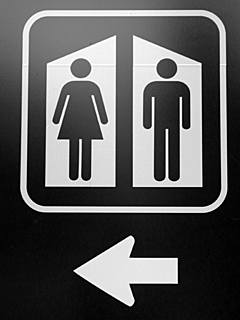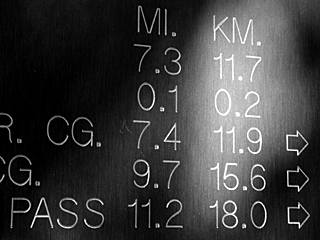
- 13 August 2001
- Twin Death Bed
- I have a lot of plans for projects I’ll never begin, let alone complete. Twin Death Bed is one such piece. In this case, the impediment is not the usual sloth and inertia, but a lack of technical resources. I was reminded of the project in gestation when I saw a sign along the Oregon coast that looked very much like my original sketch.
The idea for Twin Death Bed is based on a common wedding pledge, “Until death do us part.” I figured if you have a good thing going, why let death get in the way? Twin Death Bed provides an easy way for a couple to continue sleeping together after one person dies.
At first, the Twin Death Bed will serve as any other large, coffin-shaped bed. Ideally, the bed will remain undivided for many exciting decades. When one of the partners dies, though, s/he’s hermetically entombed in one half of the bed. When the second half of the couple dies, s/he’s sealed into the other half.
Initially, the piece seemed perfect, but then I thought of myriad complications. First, there’s a serious engineering problem if a dead body isn’t cremated. A cremated body is clean, bone-dry, and sterile. An unprocessed dead human is rather messy. Although I’m pleased that I have no empirical knowledge of corpses, an associate once sent me a copy of a patent application for coffin drain pan. I don’t like the thought of dealing with the fruits of decomposition, not to mention perhaps paying some other idiot royalties if I do.
Even if I decided that Twin Death Bed was a cremation-only piece, I still wouldn’t have the first idea of how to fabricate such a bed. Iron? Plastic? Hardwood? Steel? Fiberglass? I have no idea of how to construct such a work.
And that’s why Twin Death Bed will probably never move beyond the idea phase, at least in my lifetime. Nevertheless, please think warm thoughts about spending what remains of eternity with your partner the next time you see a sign for public toilets along the Oregon coast.

- 14 August 2001
- Death Portrait
- Tania sent me the sad news that her cat Razzia died. After succinctly mentioning the whys, whens, wheres, and hows of her kitty’s demise, Tania dedicated several paragraphs to describing what a fine companion Razzia had been, and how she’d miss her. And so on.
And then she asked me if I’d like to photograph Razzia. What a question!
I always try to make my friends happy, but there’s only so much one can do when it comes to photographing an obstinate cat. Razzia was such a cat. No matter what clever tactics I used, Razzia was always successful in avoiding my photographic gaze.
Until perhaps now, that is.
I’ve photographed my fair share of dead animals; who hasn’t? I’d like to photograph Razzia in her eternal repose, but I can’t in the near future. I won’t be back in San Francisco for several weeks, and by then the late Razzia will be unphotogenic by almost anyone’s standards (except mine).
Too bad.
I suggested that Tania employ the services of a skilled taxidermist and immortalize Razzia in the pose of her choice. That was a great career move for a friend’s dog; I’m sure Razzia wouldn’t mind an f64 session or two.
Tania is, as usual, another question.

- 15 August 2001
- As Good as Harry James
- My traveling companion and I are visiting Russ (my father’s brother) and Betty, his wife of fifty-some years. Betty is seventy-seven years old; Russ is seventy-three.
Betty described Russ’s musical virtuosity a half a century ago by explaining, “He was as good as Harry James.”
“And who’s Harry James?” my traveling companion asked after a slight hesitation.
“Would it be fair to say that he was a band leader like Glenn Miller, but that he played the trumpet instead of a trombone?” I asked.
Russ looked at Betty. Betty looked at Russ. Neither one of them said anything. Some information doesn’t travel more than a couple of generations before it’s lost.

- 16 August 2001
- Hearing Almost Every Word
- Betty stopped in the middle of saying something about something to ask Russ a question.
“Russell,” she began, “have you heard a single word I’ve said?”
“I’ve been listening, dear,” Russ replied. “I heard every word I agreed with.”
Russ and Betty are a lovely couple.

- 17 August 2001
- Back at Glacier National Park
- I’m happy to be back at Glacier National Park for the first time in over twenty years. The place looks more or less the same, perhaps because I’ve changed more than the mountains have. It’s all relative.
I’m pleased to report that the grizzly bears are still here as well. I like the idea of sharing the mountains with North America’s second most dangerous predator. Since humans—still the continental champions after dozens of millennia—are so violent, the thought of being threatened by a bear seems almost nostalgic, and perhaps a little bit quaint. (On the other hand, I can still clearly recall the animal adrenaline rush twenty-five years ago when I awoke to the sight and sound of a large bear a few meters away from my open sleeping bag. The sensation was very much like waking up to the sound of a rattlesnake, another unforgettable experience from the same period.)
I asked one of the park rangers if grizzly bears were still as unpredictable as they were a couple decades ago. The ranger said the bears’ behavior patterns were well understood, and that they posed little danger to anyone with an understanding of their habits.
“So they’re not always unpredictable?” I asked.
“That’s correct,” the ranger confirmed. “ If they were always unpredictable, then they would be predictable.”

- 18 August 2001
- What’s Bruin?
- I have the house in Woodside; I have the Porsche; I have almost everything except writing talent.
Although I have the trappings of a writer’s success, real talent eludes me. Always has, always will. I was reminded of my tragic—for me, at least—failings when I saw the announcement for the National Park Service Ranger’s Campfire Talks at Glacier National Park.
For example, I found these two talks on offer: “What’s Bruin?” and “An Interview With a Goat: Life On The Edge.”
What great copywriting! By government employees, even. I wish I could write that well. Maybe I should buy a big pickup truck. Maybe not. Beats me.


- 19 August 2001
- Measuring the Past and the Future
- Trail signs in American national parks feature measurements in both miles and kilometers. There’s a reason for this, and the reason doesn’t have anything to Americans’ fear of metric measurements.
It works like this: the future is measured in miles; the past is measured in kilometers. For example, say you’re taking a roundtrip hike on the same trail. Although you’ve walked eight kilometers, it’s only five miles back to the trailhead. Similarly, the ten-mile hike you took today becomes the sixteen-kilometer hike after the walk is completed.
And so on.


